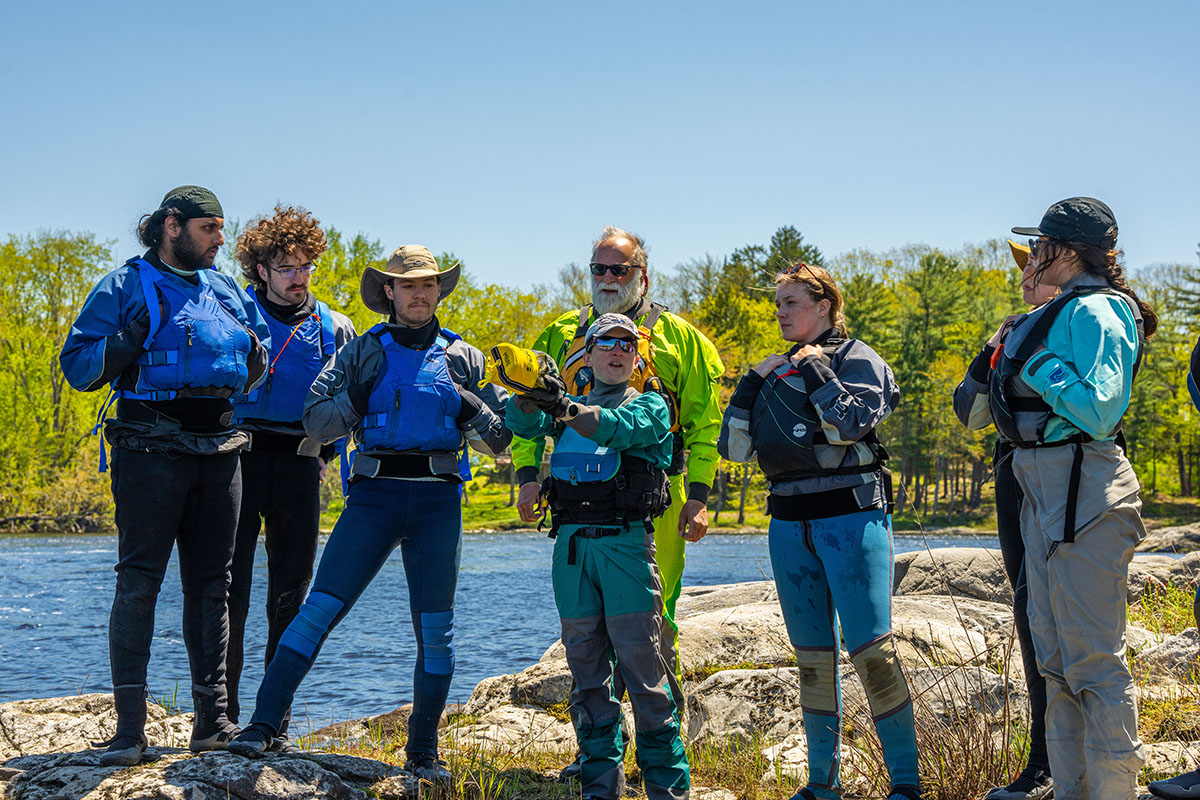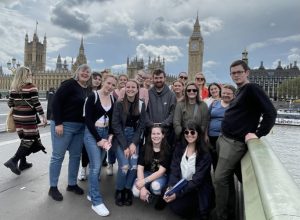
May Session courses provide students new perspectives on education, immersive learning opportunities
Before Sally Stead graduated from the University of Maine this spring, she had one more class to take: The long-running travel-study course CHF 404: Human Sexuality in Europe, taught by professor of family relations and human sexuality Sandra Caron.
The three-week May Session course takes students to London, Amsterdam and Stockholm to see first-hand how citizens and policymakers in the United Kingdom, The Netherlands and Sweden deal with issues such as teen pregnancy, contraception, abortion, sexuality education, sexually transmitted diseases and other topics.
“It was incredibly immersive,” says Stead of Cumberland, Maine, who earned her bachelor’s degree in child development and family relations. “In Europe, they’re much more open about sex and sexuality education than we are.”
May Session courses, which are part of Summer University, typically run for three weeks and begin the week after spring semester. They can help UMaine students fulfill requirements, get ahead in their program of study, or lighten their loads in the spring and fall. For students in the College of Education and Human Development, they can also broaden their understanding of teaching through unique and immersive experiences.
Stead, the student coordinator for Sexual Health and Reproductive Education (SHARE) during her time at UMaine, was one of 14 students in the Human Sexuality in Europe course this year, the first time it has been offered since 2019 due to COVID-19 pandemic travel restrictions the previous three years. For Stead, it was her first time abroad. In addition to finding Europeans to be much more candid in talking about sex and sexuality, she says one of the things that struck her was how they don’t talk down to young people.
“In Sweden, we went to a youth clinic where, starting at puberty, they offer young people access to sexual and mental health and wellness services and products,” says Stead. “Eighth graders visited the clinic as part of their classes, so they were already familiar with it and all that it provided.”

Caron, a highly regarded expert on sexuality education, has taught the European travel study course since 1996. Her contacts at organizations like the International Planned Parenthood Federation in London make the class a unique learning experience for students.
“It really opens their eyes to other ways of thinking about sexuality and sex education,” Caron says. “I like to say that in Europe, they are more realistic, and less moralistic. Their policies related to sexuality tend to be driven more by research than they are in the U.S.”
Harjot Singh, a rising senior majoring in biochemistry and microbiology, also took a May Session class, KPE 280: Introduction to Paddling Instruction and Safety. The course, which counted toward his minor in outdoor leadership, covered the fundamentals of paddling and paddling instruction for canoeing, kayaking and stand-up paddle boarding, as well as fresh water safety, trip planning, on-water group management and equipment management. It included a two-day Level 4 Swiftwater Rescue certification course, completed on Kenduskeag Stream, as well as two days of leading K–12 students from East Millinocket in canoeing instruction on Jerry Pond. Other locations used in the course were Pushaw Stream, Birch Stream and Perch Pond.
“The fact that it was hands-on really helped me retain the information,” says Singh, who took the class despite not knowing how to swim. “You can read about different paddling strokes or watch videos about rescue techniques. But the best way to learn is to do them in the water.”
Singh was born in India and moved to Medford, Massachusetts with his family when he was nine. When deciding which college to attend, he wanted to study somewhere close to forests with “easy access to nature.”
“I love the outdoor leadership minor, because it gets my mind off the biochemistry and microbiology stuff,” he says “The classes have really helped get me out of my shell. I can be kind of shy, so being in a group setting and learning leadership skills I wouldn’t have gotten in my other classes has been great.”
Lecturer in outdoor leadership Lauren Jacobs, who has taught the paddling course since 2019 when the outdoor leadership program was established in the College of Education and Human Development, says part of the appeal for students is the bond they form as a group and the intensive nature of a course that lasts less than a month.
“This year’s class did a great job and learned a lot in some very challenging, windy conditions,” Jacobs says. “I’m most proud of the work they did with students from East Millinocket, applying the group leadership and instructional skills we worked on earlier in the class.”
Visit the Summer University website for more information.
Contact: Casey Kelly, casey.kelly@maine.edu
